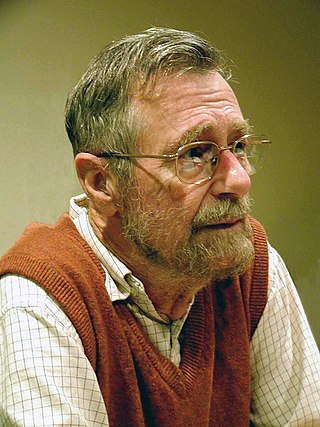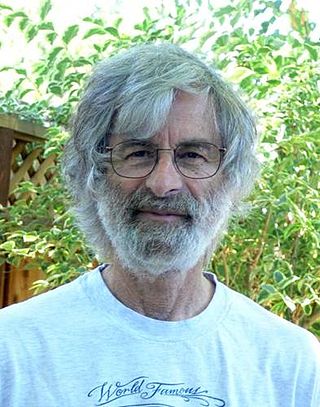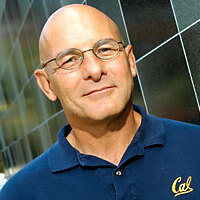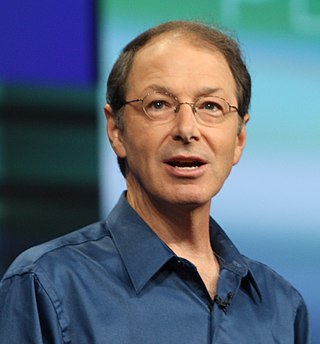Related Research Articles

Edsger Wybe Dijkstra was a Dutch computer scientist, programmer, software engineer, mathematician, and science essayist.
Software crisis is a term used in the early days of computing science for the difficulty of writing useful and efficient computer programs in the required time. The software crisis was due to the rapid increases in computer power and the complexity of the problems that could be tackled. With the increase in the complexity of the software, many software problems arose because existing methods were inadequate.

Leslie B. Lamport is an American computer scientist and mathematician. Lamport is best known for his seminal work in distributed systems, and as the initial developer of the document preparation system LaTeX and the author of its first manual.

David Andrew Patterson is an American computer scientist and academic who has held the position of professor of computer science at the University of California, Berkeley since 1976. He is a computer pioneer. He announced retirement in 2016 after serving nearly forty years, becoming a distinguished software engineer at Google. He currently is vice chair of the board of directors of the RISC-V Foundation, and the Pardee Professor of Computer Science, Emeritus at UC Berkeley.

Richard Farris Rashid is the founder of Microsoft Research, which he created in 1991. Between 1991 and 2013, as its chief research officer and director, he oversaw the worldwide operations for Microsoft Research which grew to encompass more than 850 researchers and a dozen labs around the world.
Nancy Ann Lynch is a computer scientist affiliated with the Massachusetts Institute of Technology. She is the NEC Professor of Software Science and Engineering in the EECS department and heads the "Theory of Distributed Systems" research group at MIT's Computer Science and Artificial Intelligence Laboratory.
Scott J. Shenker is an American computer scientist, and professor of computer science at the University of California, Berkeley. He is also the leader of the Extensible Internet Group at the International Computer Science Institute in Berkeley, California.

Joseph Yehuda Halpern is an Israeli-American professor of computer science at Cornell University. Most of his research is on reasoning about knowledge and uncertainty.

Éva Tardos is a Hungarian mathematician and the Jacob Gould Schurman Professor of Computer Science at Cornell University.
ACM SIGACT or SIGACT is the Association for Computing Machinery Special Interest Group on Algorithms and Computation Theory, whose purpose is support of research in theoretical computer science. It was founded in 1968 by Patrick C. Fischer.

Yale Nance Patt is an American professor of electrical and computer engineering at The University of Texas at Austin. He holds the Ernest Cockrell, Jr. Centennial Chair in Engineering. In 1965, Patt introduced the WOS module, the first complex logic gate implemented on a single piece of silicon. He is a fellow of both the Institute of Electrical and Electronics Engineers and the Association for Computing Machinery, and in 2014 he was elected to the National Academy of Engineering.
Maurice Peter Herlihy is an American computer scientist active in the field of multiprocessor synchronization. Herlihy has contributed to areas including theoretical foundations of wait-free synchronization, linearizable data structures, applications of combinatorial topology to distributed computing, as well as hardware and software transactional memory. He is the An Wang Professor of Computer Science at Brown University, where he has been a member of the faculty since 1994.

Randal E. Bryant is an American computer scientist and academic noted for his research on formally verifying digital hardware and software. Bryant has been a faculty member at Carnegie Mellon University since 1984. He served as the Dean of the School of Computer Science (SCS) at Carnegie Mellon from 2004 to 2014. Dr. Bryant retired and became a Founders University Professor Emeritus on June 30, 2020.
Keith Marzullo is the inventor of Marzullo's algorithm, which is part of the basis of the Network Time Protocol and the Windows Time Service. On August 1, 2016 he became the Dean of the University of Maryland College of Information Studies after serving as the Director of the NITRD National Coordination Office. Prior to this he was a Professor in the Department of Computer Science and Engineering at University of California, San Diego. In 2011 he was inducted as a Fellow of the Association for Computing Machinery.

Cynthia Dwork is an American computer scientist best known for her contributions to cryptography, distributed computing, and algorithmic fairness. She is one of the inventors of differential privacy and proof-of-work.
Ravishankar K. Iyer is the George and Ann Fisher Distinguished Professor of Engineering at the University of Illinois at Urbana-Champaign. He is a specialist in reliable and secure networks and systems.
Thomas E. Anderson is an American computer scientist noted for his research on distributed computing, networking and operating systems.
Kenneth P. Birman is a professor in the Department of Computer Science at Cornell University. He currently holds the N. Rama Rao Chair in Computer Science.

Hagit Attiya is an Israeli computer scientist who holds the Harry W. Labov and Charlotte Ullman Labov Academic Chair of Computer Science at the Technion – Israel Institute of Technology in Haifa, Israel. Her research is in the area of distributed computing.
Lorenzo Alvisi is an Italian computer scientist and Tisch University Professor at Cornell University. Prior to joining Cornell, he was a University Distinguished Teaching Professor and the holder of the Endowed Professorship #5 at the University of Texas at Austin. His research focuses on distributed systems and dependability. He holds a laurea in Physics from the University of Bologna (1987), and an MS and PhD in Computer Science from Cornell University. He is a fellow of the Association for Computing Machinery since 2010 and of the Institute of Electrical and Electronics Engineers since 2016.
References
- ↑ "Fred B. Schneider Vita". U.S. Department of Energy Office of Scientific and Technical Information. Archived from the original on 5 March 2016.
- ↑ Fred B. Schneider — biography, Cornell University, USA.
- ↑ Baaba Andam, Fred B. Schneider — Network Security Systems: Building a Better Defense , Faculty of Computing and Information Science, Cornell University, USA.
- ↑ Fred B. Schneider Publications, Cornell University, USA.
- ↑ Medlemmer, Norwegian Academy of Technological Sciences , retrieved 2020-04-06
- ↑ Fred B. Schneider — biography Archived 2011-06-07 at the Wayback Machine , EDUCAUSE, USA.
- ↑ "Newcastle University, School of Computing, Honorary Degree". Archived from the original on 2017-11-15. Retrieved 2017-11-15.
- ↑ "IEEE Emanuel R. Piore Award Recipients" (PDF). IEEE. Archived from the original (PDF) on February 17, 2013. Retrieved March 20, 2021.
- ↑ 2018 Edsger W. Dijkstra Prize in Distributed Computing, ACM Principles of Distributed Computing 2018
- ↑ "Historic Fellows". AAAS. 1992. Retrieved 2022-08-25.
- ↑ "ACM Fellows". ACM. 1995. Retrieved 2022-08-26.
- ↑ "Fred B Schneider: ACM Fellow". ACM. 1995. Retrieved 2022-08-26.
- ↑ "Computing Science Honorary Degrees". Newcastle University. 2003. Retrieved 2022-08-25.
- ↑ "FRED BARRY SCHNEIDER : DSC" (PDF). 2003. Retrieved 2022-08-26.
- ↑ "The Hall of Fame Award". ACM SIGOPS. 2007. Retrieved 2022-08-26.
- ↑ "IEEE Fellows Directory". IEEE. 2008. Retrieved 2022-08-26.
- ↑ Medlemmer, Norwegian Academy of Technological Sciences , retrieved 2020-08-26
- ↑ "IEEE Members Directory". NAE. 2011. Retrieved 2022-08-26.
- ↑ "Service to CRA Award". CRA. 2016. Retrieved 2022-08-25.
- ↑ "IFIP WG 10.4 on Dependable Computing and Fault Tolerance". IFIP Working Group 10.4. 2017. Retrieved 2022-08-26.
- ↑ "Member Directory". American Academy of Arts and Sciences. 2017. Retrieved 2022-08-25.
- ↑ "34th IEEE Computer Security Foundations Symposium". IEEE. 2021. Retrieved 2022-08-25.